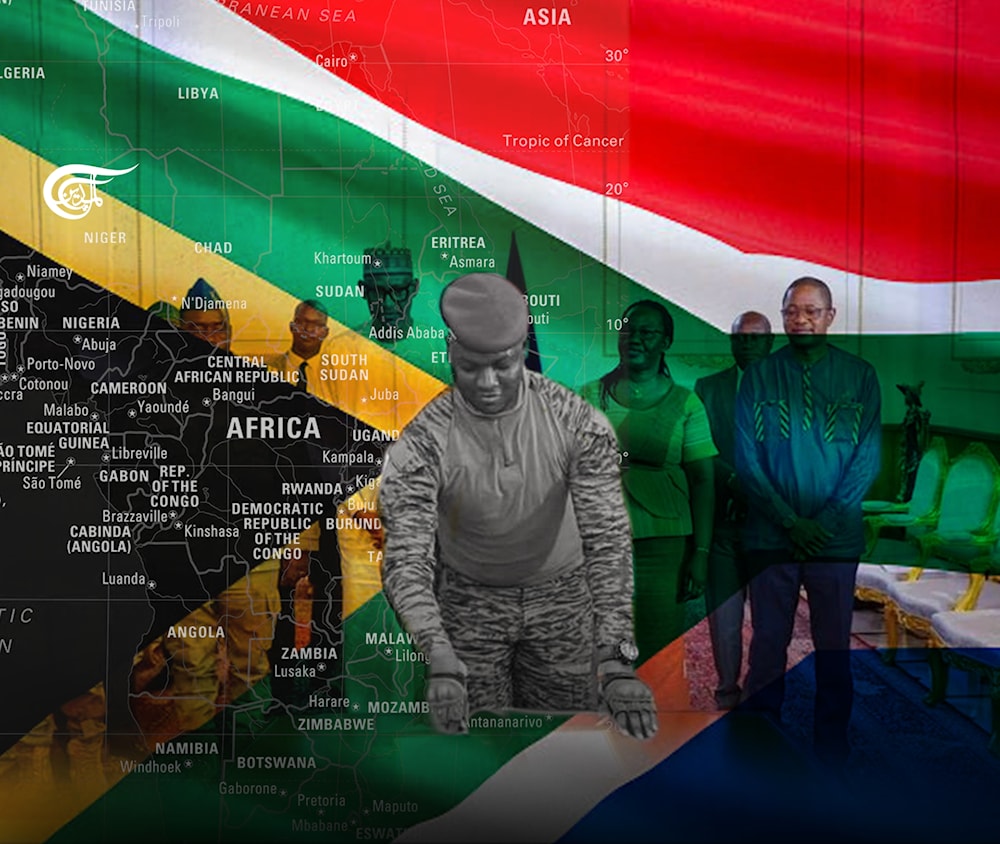Africa and Multipolarity: An Analysis of Recent Events
All of that said, it is important to keep an eye on South Africa’s case against “Israel” in the ICJ, which despite its symbolic nature, does drain some resources of the Zionists.
-

Africa and Multipolarity: An Analysis of Recent Events (Illustrated by Hadi Dbouk to Al Mayadeen English)
On the African continent, the struggle to achieve the status of an independent pole in an increasingly multipolar world is an uphill battle. The continent has seen several re-awakenings as well as several setbacks at the present juncture. In this article, four flashpoints on the African continent will be discussed; the status of the Alliance of Sahel States (AES), the sordid activities of the Zionists in Malawi, South Africa’s case against the Zionists at the ICJ, and Djibouti’s affirmation of sovereignty.
Mali, Niger, and Burkina Faso signed the Liptako-Gourma Charter in September of 2023. This charter is a mutual defense pact which contains provisions for mutual protection against Al Qaeda affiliates which have been terrorizing the region since the fall of Colonel Gaddafi’s Libya. The AES are banding together to defend their sovereignty from terrorist groups, while also promoting economic and political integration in the hopes of forming a federation in the future. The signatories of the Liptako-Gourma agreement have collectively exited ECOWAS, the regional economic bloc. The AES cited ‘inhumane sanctions’ as their reason for leaving.
I have discussed in earlier articles the class nature of the army in the nation with respect to the AES, and the potential capabilities and limits of a nationalist petit bourgeois movement in the military. Yet it is important to note that in the case of Burkina Faso especially, the new government has been reaffirming its position in the anti-imperialist camp. As reported by Ben Norton in the Geopolitical Economy Report, Captain Ibrahim Traore and PM Apollinaire Joachim Kyélem de Tambèla have made visits to Russia, Venezuela, and Nicaragua, respectively. Traore praised the former Soviet Union for its great sacrifices against Nazism, while Tambèla praised the socialist systems of Nicaragua and Venezuela; “Nicaragua’s struggle is also that of our people”. Traore said of Tambèla’s visit to Latin America that it is part and parcel of the struggle towards the ‘refoundation of the nation’. Yet, despite their anti-imperialist foreign policy, the AES countries still face violence from AQIM and other Salafi groups in the region.
The Burkinabe military has recently dismantled a group which was seeking to sew discord and aid foreign efforts to destroy the AES, according to the government spokesman. While articles in Foreign Policy and other Western outlets seek to delegitimize the movement by arguing that there has been an uptick in violence from Salafi groups and thus hinting that the AES choice to leave various security arrangements with France, the US, and the EU are a ‘strategic mistake’.
Although, what if we thought about things from another angle? Much like the argument of Al Mayadeen contributor Shabir Rizvi regarding the PMF in Iraq and their relationship to ISIS; could it be that the uptick in violence highlights the West’s relationship to Salafi terrorist groups, which seem to never attack the US drone base in Agadez, Niger for example? There is yet much to consider regarding the imperialists’ adept use of fifth columns in the countries and regions they are targeting.
Eastward across the continent, small Djibouti has affirmed that they will not allow the US to use their country as a forward base to continue their illegal assault on Yemen. While there is already a US Patriot Air Missile system, ostensibly there to protect ‘American interests’ in the region, the government of Djibouti has also refused to condemn AnsarAllah who is providing “legitimate relief for the Palestinians”. Djibouti also refused to join the ‘Prosperity Guardian’ task force. As of January 19th, Danish shipping giant Maersk has ended all services to Djibouti. This decision could potentially inflict significant damage on their economy, as it heavily relies on maritime trade. While this is a small step, it shows that the world community stands against the Zionist genocide of the Palestinians.
While Djibouti’s brave stand is a welcome addition to the worldwide condemnation of the Zionist regime, “Israel” is attempting again to make inroads into Africa, this time in Malawi. After Operation Al Aqsa Flood began on October 7th, roughly 17,000 foreign workers left “Israel” due to safety concerns. Most of these workers are Thai, Filipino, and Nepali, and they are among around 100,000 foreign workers in “Israel” engaged mostly in farm, caretaking, and construction labor. This strategy of the Zionists to limit and control the number of Palestinian laborers in the colony has been thoroughly documented by Ali Kadri in his book “A Theory of Forced Labour Migration”. Unfortunately, a lacuna in Kadri’s work has to do with foreign laborers which act as a sort of ‘coolie’ labor akin to the British Empire’s strategy in the West Indies. This new deal with Malawi is as predatory as any Zionist foreign relations. Without shifting some blame away from Malawi’s comprador leadership, it is important to note some of the details of this deal. In exchange for (potentially) thousands of Malawian farm workers, "Israel" has promised $60 million in aid to the South African nation which is facing a debt crisis and economic collapse. The Malawian workers will supposedly make $1,500 per month, but a large portion of this will be transferred into an account to pay some of Malawi’s foreign debt. Some observers are likening this to a modern form of slavery at worst, and an exploitative garnishing of wages at best. The Malawian opposition has called this an ‘evil deal’ that will see Malawi’s best and brightest farm workers sent into a colonial war zone. Just south of Malawi, South Africa is opening a legal front in the war for Palestinian liberation.
South Africa has taken “Israel” to court in the ICJ and is formally accusing it of genocide. For some, this is a symbolic gesture on behalf of the South Africans, who are no strangers to racist white minority rule. The argument that this is symbolic has both positive and negative connotations. On the one hand, the ICJ and the entire apparatus of The Hague, in general, serve as a soft power arm of the imperial core to condemn mostly African and Arab leaders who transgress the ‘rules-based order’. On the other hand, this is a very public and well-known venue in the West where “Israel” is forced to put their naked propaganda to the test. The Israeli arguments about South Africa’s ‘procedural errors’ in filing the case represent their inability to hide their genocidal intent except through pedantic appeals to paperwork. South Africa’s legal team has provided unassailable evidence that "Israel" is committing genocide against the people of Palestine. The arguments center around the system of apartheid created in the West Bank, the massive death toll in Gaza, and the caste system that Arabs are subjected to inside “Israel”. Years of colonial invasion and assault are coming to a head as the resistance forces deter Israel in Gaza, causing massive casualties among the Zionist occupying forces. At the same time, the Zionists are not helping their case at the ICJ; in recent days the IOF have mounted assaults on Palestinians in the West Bank. A major reason for Hamas’s choice to launch Operation Al Aqsa Flood is Bezalel Smotrich’s approval of millions of shekels for continued settlement building in the occupied territories. Since October, other Israeli officials and businessmen have not hidden their intent for a final solution in Gaza. These plans include resettling Gaza, expelling Palestinians, and ‘routing’ Hamas.
So far, "Israel" has only managed to assassinate Saleh Al Arouri and other Resistance Axis commanders while suffering losses in their ground assault on Gaza. All of that said, it is important to keep an eye on South Africa’s case against “Israel” in the ICJ, which despite its symbolic nature, does drain some resources of the Zionists, which further strains their bottom line.

 Hanna Eid
Hanna Eid
 8 Min Read
8 Min Read











